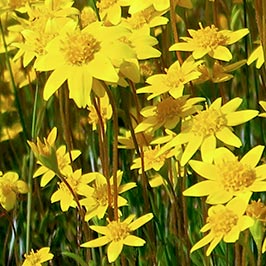Lasthenia glabrata
Lasthenia californica
yellow ray goldfields
California goldfields, goldfields, slender goldfields
erect, branched distally, glabrous or slightly hairy.
erect or decumbent, branched proximally or distally, ± hairy.
linear or subulate, 40–150 × 2–3+ mm, margins entire, faces glabrous.
linear to oblanceolate or oblong, 8–210 × 1–5.5(–15) mm, (± fleshy in coastal forms) margins entire or with 3–5+ teeth, faces glabrous or ± hairy.
hemispheric, 5–10 mm.
campanulate to depressed-hemispheric or hemispheric, 5–14 mm.
± conic, papillate, glabrous or sparsely hairy.
conic, muricate, glabrous.
7–15; (corollas yellow) laminae oblong, 4–14 mm.
6–16;
laminae linear to oblong, 5–18 mm.
10–14, ± lanceolate (distinct tips ± deltate), glabrous but for apices.
(persistent or falling with cypselae) 4–16 (in 1–2 series), elliptic to ovate or lanceolate to oblong, hairy.
gray, clavate or obovoid, 2–3.5 mm, margins not ciliate, faces glabrous, or hairy and papillate (papillae rusty or yellowish, wartlike);
pappi 0.
black to gray or silver-gray, linear to narrowly clavate, to 4 mm, glabrous or hairy;
pappi 0, or of 1–7 translucent (rarely opaque), brown (rarely white), linear to subulate, aristate scales.
appendages deltate or broadly ovate.
appendages deltate to sublanceolate.
Lasthenia glabrata
Lasthenia californica
Subspecies 2 (2 in the flora).
Historically, aboriginal Californians used fruits and leaves of Lasthenia glabrata for food. The subspecies are allopatric and almost identical except for their cypselae.
(Discussion copyrighted by Flora of North America; reprinted with permission.)
Subspecies 3 (3 in the flora).
Plants of Lasthenia californica, especially those in coastal populations, have the largest, showiest heads in the genus. Report of L. californica from Massachusetts was not confirmed for this study
(Discussion copyrighted by Flora of North America; reprinted with permission.)
1. Cypselae glabrous, not papillate | subsp. glabrata |
1. Cypselae ± hairy and papillate | subsp. coulteri |
1. Annuals; coastal or inland; n California, s Oregon | subsp. californica |
1. Perennials (sometimes flowering first year); coastal; California | → 2 |
2. Roots fleshy, clustered; stems erect, branched distally; leaf blades 1–2+ mm wide | subsp. bakeri |
2. Roots usually not fleshy or clustered; stems decumbent, branched proximally; leaf blades 1.5–5.5(–15) mm wide | subsp. macrantha |


